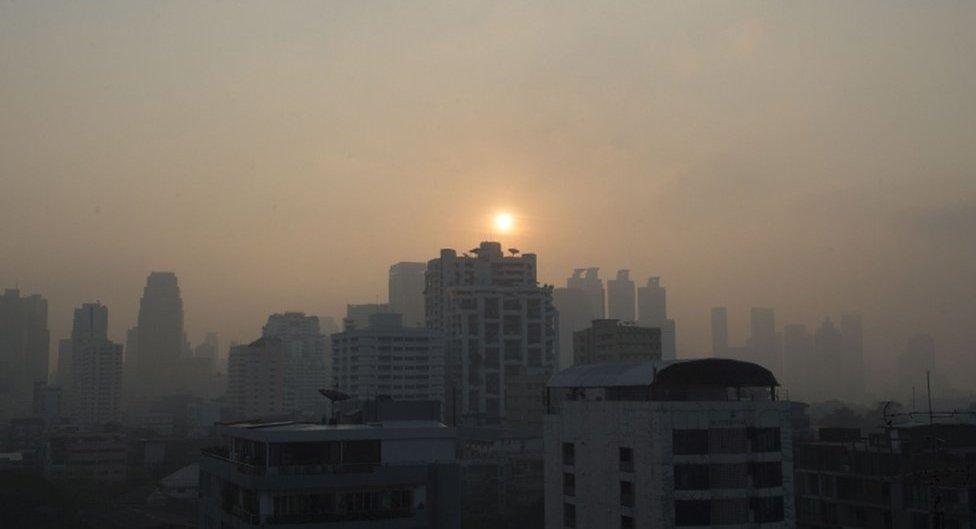Air pollution: Thailand schools still closed due to 'unhealthy' smog levels
- Published
- comments

The smog is among the worst Thailand has ever seen
Toxic smog in Bangkok, Thailand, has forced more than 400 schools to close to protect children from its harmful effects.
The capital city is experiencing some of its worst-ever air pollution levels, caused by ultra-fine dust particles known as PM 2.5.
Traffic exhaust, construction works, burning crops and pollution from factories are blamed for the haze.
The government's efforts to clear the air have so far failed.
Dust particles can irritate the lungs causing breathing problems
It has tried creating rain clouds using special planes, reducing traffic, and hosing down streets, with little impact.
According to The World Air Quality Index project, Bangkok's Air Quality Index (AQI) is currently at around 170, making it "unhealthy".
Those celebrating the Lunar New Year holidays this week have been asked not to burn incense or light fireworks.
What are PM 2.5 particles?
Particulate matter (PM) 2.5 is a type of pollution involving tiny particles less than 2.5 microns (0.0025mm) in diameter - that's around 16 times thinner than a width of hair.
A second type, PM 10, is of grainier particles with a diameter of up to 10 microns.
Some occur naturally - for example from dust storms and forest fires, others from human industrial processes.
They often consist of fragments that are small enough to reach the lungs or, in the smallest cases, to cross into the bloodstream as well.
Newsround has been looking at at how other countries around the world have been tackling air pollution.
New Delhi, India
Watch their report.
The World Health Organisation - a group who keep an eye on the health standards in different countries - found that 13 of the world's 20 most polluted cities were in India.
The capital city New Delhi's Air Quality Index is currently around 390, a "hazardous" level of pollution.
One of the main reasons behind the pollution is the huge increase in the number of vehicles on the roads.
Air quality in New Delhi also worsens every year in November and December as farmers in the neighbouring states of Punjab and Haryana burn crop stubble to clear their fields.
Beijing, China
WATCH: Smog makes Beijing disappear in minutes (Jan 2017)
In 2014, China's government said they were working hard to reduce the amount of pollution in the air.
But for big cities like Beijing, air pollution levels can still be high for most of the year.
Pupils in Beijing talk about the thick smog
Children who live and go to school in Beijing in China say the thick smog that appears stops them playing outside and doing some sports.
If they do go out, most children wear face masks.
London, England
WATCH: What's being done to improve air quality in London? (Jan 2018)
In January 2019, the UK government published a new plan with ideas for how to tackle air pollution in England.
It's Clean Air Strategy includes new rules for farms, open fires and wood burning stoves.
It hopes the plan will halve the number of people breathing in harmful particles by 2025.
One issue is the burning of fuels such as wood and coal in open fires and stoves in homes.
The most polluting fuels will be banned and only the cleanest stoves will be sold by 2022.
- Published8 January 2018
- Published30 June 2017
- Published30 July 2018
